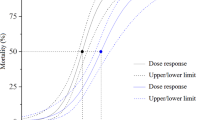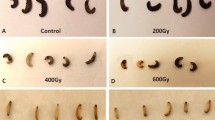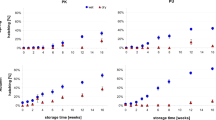Abstract
THE ease with which diapause may be broken in the eggs of a common North American grasshopper, Melanoplus differentialis differentialis (Thomas), with mineral (paraffin) oil has been described recently1. Treatment with the oil for 1 hr. or less is sufficient to remove the waterproofing materials from the hydropyle. After the eggs are taken from the oil, cleaned and transferred to a medium from which they Can absorb water, development begins and they hatch in a completely normal manner about 18 days later. No harmful effect of the oil on the eggs can be detected even if they are left in it for as long as four weeks.
This is a preview of subscription content, access via your institution
Access options
Subscribe to this journal
Receive 51 print issues and online access
$199.00 per year
only $3.90 per issue
Buy this article
- Purchase on Springer Link
- Instant access to full article PDF
Prices may be subject to local taxes which are calculated during checkout
Similar content being viewed by others
References
Slifer, E. H., J. Exp. Zool., 138, 259 (1958).
Boell, E. J., J. Cell. Comp. Physiol., 6, 369 (1935).
Slifer, E. H., Physiol. Zool., 3, 503 (1930).
Andrewartha, H. G., Biol. Rev., 27, 50 (1952).
Hinton, H. E., Sci. Prog., 45, 307 (1957).
Author information
Authors and Affiliations
Rights and permissions
About this article
Cite this article
SLIFER, E. Survival of Grasshopper Eggs Kept for Long Periods in Mineral Oil. Nature 184, 1424–1425 (1959). https://doi.org/10.1038/1841424b0
Issue Date:
DOI: https://doi.org/10.1038/1841424b0
Comments
By submitting a comment you agree to abide by our Terms and Community Guidelines. If you find something abusive or that does not comply with our terms or guidelines please flag it as inappropriate.



